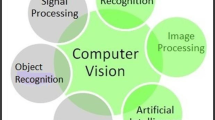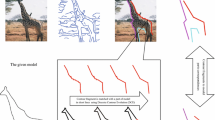
Overview
- Integrates computer vision, pattern recognition, and AI
- Presents original research that will benefit researchers and professionals in computer vision, pattern recognition, target recognition, machine learning, evolutionary learning, image processing, knowledge discovery and data mining, cybernetics, robotics, automation and psychology
Part of the book series: Monographs in Computer Science (MCS)
Access this book
Tax calculation will be finalised at checkout
Other ways to access
About this book
Evolutionary computation is becoming increasingly important for computer vision and pattern recognition and provides a systematic way of synthesis and analysis of object detection and recognition systems. Incorporating "learning" into recognition systems will enable these systems to automatically generate new features on the fly and cleverly select a good subset of features according to the type of objects and images to which they are applied.
This unique monograph investigates evolutionary computational techniques--such as genetic programming, linear genetic programming, coevolutionary genetic programming and genetic algorithms--to automate the synthesis and analysis of object detection and recognition systems.
The purpose of incorporating learning into the system design is to avoid the time-consuming process of feature generation and selection and to reduce the cost of building object detection and recognition systems.
Researchers, professionals, engineers, and students working in computer vision, pattern recognition, target recognition, machine learning, evolutionary learning, image processing, knowledge discovery and data mining, cybernetics, robotics, automation and psychology will find this well-developed and organized volume an invaluable resource.
Similar content being viewed by others
Table of contents (8 chapters)
-
Front Matter
-
Back Matter
Authors and Affiliations
Accessibility Information
PDF accessibility summary
This PDF is not accessible. It is based on scanned pages and does not support features such as screen reader compatibility or described non-text content (images, graphs etc). However, it likely supports searchable and selectable text based on OCR (Optical Character Recognition). Users with accessibility needs may not be able to use this content effectively. Please contact us at accessibilitysupport@springernature.com if you require assistance or an alternative format.
Bibliographic Information
Book Title: Evolutionary Synthesis of Pattern Recognition Systems
Authors: Bir Bhanu, Yingqiang Lin, Krzysztof Krawiec
Series Title: Monographs in Computer Science
DOI: https://doi.org/10.1007/b105515
Publisher: Springer New York, NY
eBook Packages: Computer Science, Computer Science (R0)
Copyright Information: Springer-Verlag New York 2005
Hardcover ISBN: 978-0-387-21295-1Published: 17 February 2005
Softcover ISBN: 978-1-4419-1943-4Published: 29 November 2010
eBook ISBN: 978-0-387-24452-5Published: 30 March 2006
Series ISSN: 0172-603X
Series E-ISSN: 2512-5486
Edition Number: 1
Number of Pages: XXIV, 296
Number of Illustrations: 95 b/w illustrations
Topics: Pattern Recognition, Computer Imaging, Vision, Pattern Recognition and Graphics, Image Processing and Computer Vision, Artificial Intelligence, User Interfaces and Human Computer Interaction, Computation by Abstract Devices



